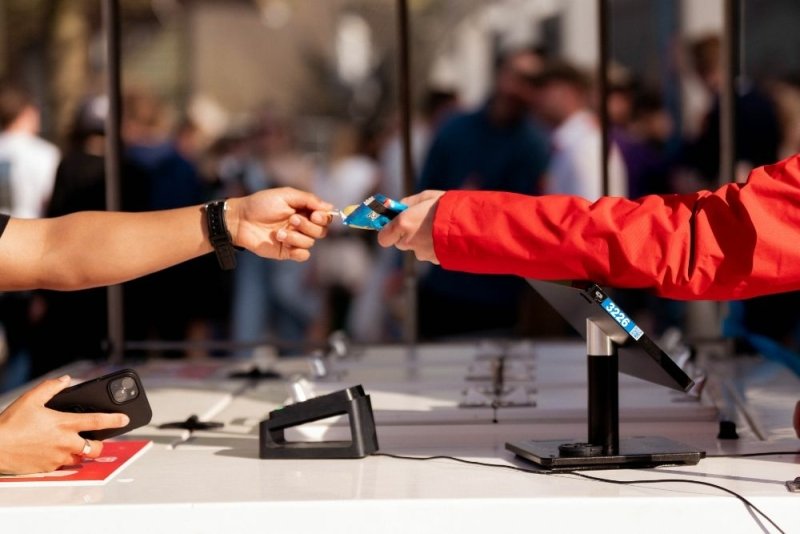There are more and more shops, catering establishments and festivals where cashless payment is not only possible, but has become the standard. The event sector was already further along than, for example, retail. For years, it was normal to first buy festival tokens with cash because cash was not accepted on the festival grounds. Nowadays, the ways to pay cashless have become much more sophisticated. Exchanging tokens or tickets at the cash register is unnecessarily complicated and can even reduce turnover. Digital payment works better. But not everyone is convinced that pin-only is the best option. How is the growth of cashless payment in the Netherlands going and what can we learn from the results within the event sector?
Do you have other questions or challenges regarding cashless payment during festivals or events? Contact the experts at Moneycomb, we are happy to help you.
May shops refuse cash?
In the Netherlands, there are a number of coins and types of banknotes that you can use to pay. There are clear rules for this, and there are uniform regulations within the euro countries. However, a legal tender does not automatically mean that the operator must accept it. If you want to pay for a bowl of kibbeling at the market with a bag full of euro cents, the fishmonger will probably not accept it. Nor does he have to. The shopkeeper determines which legal tender methods are accepted. This can be cash, debit card, credit card or a combination of payment options. It is absolutely permitted to opt for completely cashless payment, but it is not equally suitable in every sector.
What is the Cash Money Covenant?
De Nederlandsche Bank has created the Cash Money Covenant. This is a collectively drawn up document with agreements in which a number of organisations and interest groups advocate for cash payment options in various sectors. In addition to the well-known banks such as ABN AMRO, ING and Rabobank, representatives of other groups are also part of this covenant. This varies from the Royal Dutch Hospitality Association to MKB-Nederland, but also the consumer association and several senior citizens’ organisations. It is striking that many associations that stand up for the rights of senior citizens participate in the Cash Money Covenant. This indicates that there is a generation gap.

For whom is cashless payment suitable?
If you look at the facts very objectively, then cashless payment should be ideal for seniors. Less cash in your pocket reduces theft on the street, to name just one example. There is no need to change or add money at the checkout, these are all objective advantages. But seniors are used to cash, it offers security. Switching to mobile payment with Apple Pay is not a realistic option for all people over 65.
It actually goes without saying that young people in particular have less and less need for cash. After school, teenagers quickly score a frikandel roll with energy drink in the supermarket and they walk past the self-service checkout. The intermediate generations are also increasingly using cashless payment. Even if it is not their preference, they will not have a problem if pin-only is the only option. Certainly not if the seller can substantiate this. Think about increased safety and hygiene.
Where can you pay PIN only?
As mentioned, at Moneycomb we see that event organizers are quickly picking up on the trend of cashless payment and are also seeing the benefits. In this process, we remove the technical and logistical barriers to further streamline the transition. What are companies in other sectors doing with cashless payment and what are their experiences?

IKEA: There were already more ‘pin-only’ branches abroad, cashless payment in the Netherlands at IKEA was first introduced at the Son branch. A ‘cold turkey’ approach with a complete transition to cashless turned out to be a step too far. A middle ground was found with a cash register where cash payment was still possible.
Domino’s: This pizza chain leaves it up to the individual branches to make a choice. In particular, the locations with a higher risk of robberies have made the switch to cashless payment. In addition, the umbrella organization is strongly promoting advance payment via the app.
Hellendoorn: This is the first amusement park in the Netherlands to operate completely cashless since August 2023. This was a big step, especially because the park also receives many guests from across the border. The Netherlands is considerably further ahead than Germany, for example, when it comes to cashless payment.
There is a clear trend from commercial institutions to encourage cashless payment. This is not received equally well by everyone, such a transition certainly needs time and explanation. Why cashless only at festivals? Because it is practical for the organization and guests, it increases safety and there are plenty of ways to make cashless payment accessible for all users. Think of mobile payment, order columns or wristbands with credit.
Do you want to know more about cashless payment during events? Inquire without obligation about the possibilities with the specialists at Moneycomb.